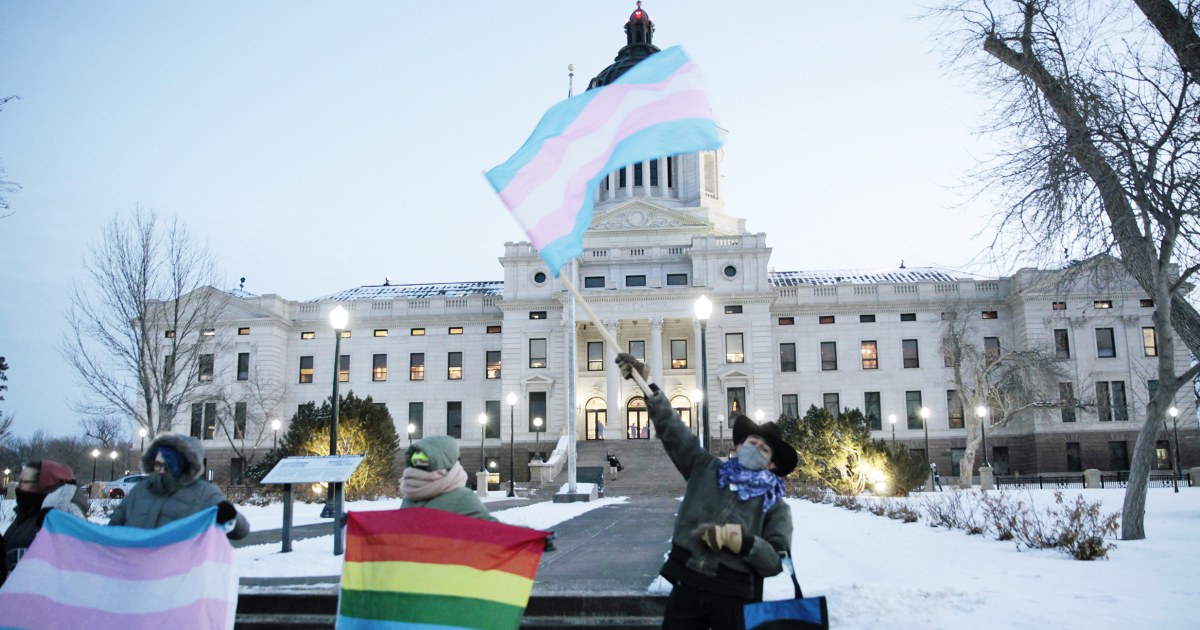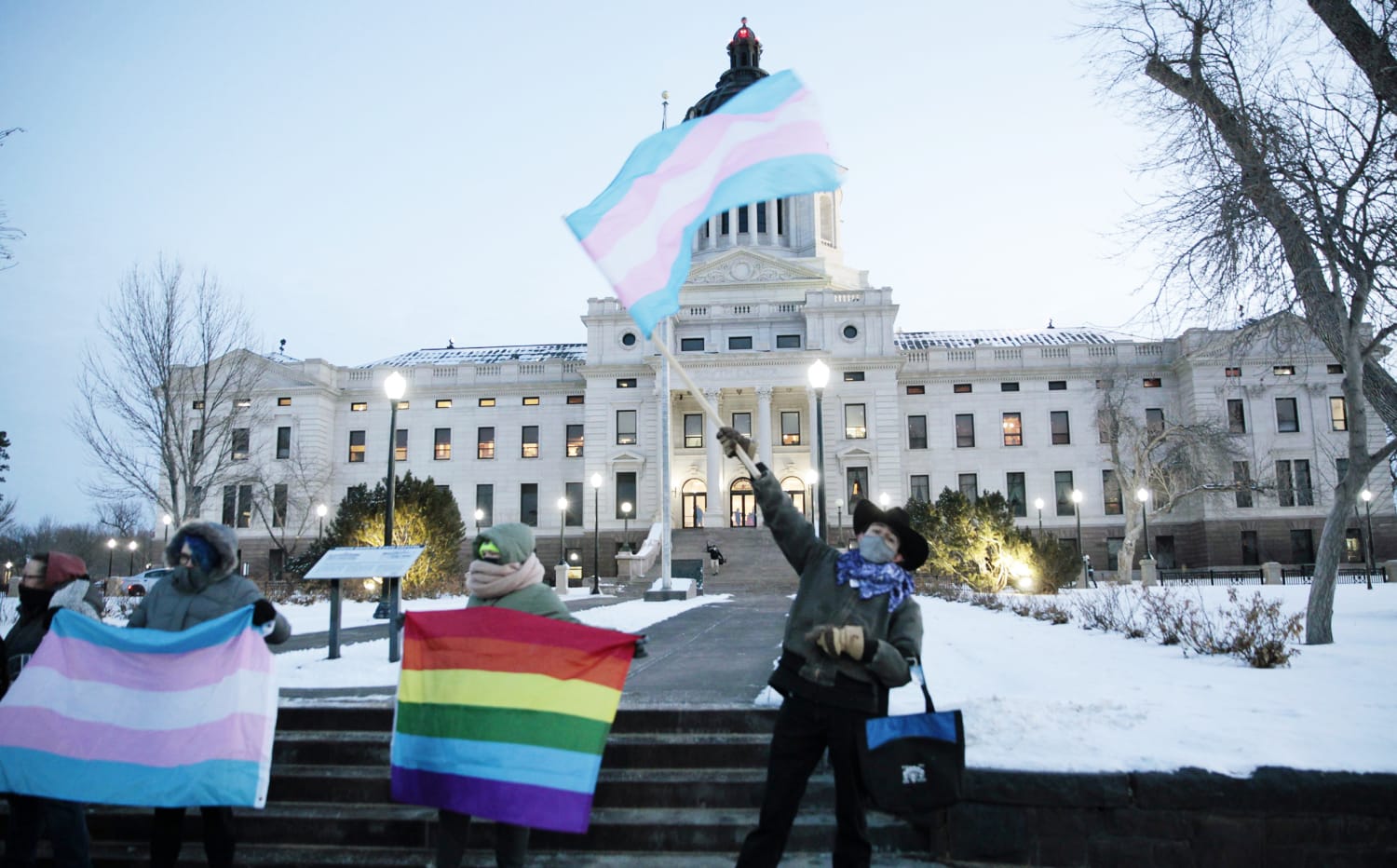
PIERRE, S.D. — South Dakota Republican lawmakers on Tuesday revived a proposed law that would ban people from changing the sex designation on their birth certificates, even after a House committee rejected the bill that LGBTQ advocates decried as an attack on transgender people.
Republicans in the House forced the bill to be brought to a vote by the full House through a rarely used legislative procedure known as a “smoke out.” At least one-third of the House supported the procedure.
A committee of lawmakers had earlier Tuesday dismissed the bill on a seven-to-six vote after five Republicans joined two Democrats to oppose the bill, which would stop people from changing the sex listed on birth certificates after one year from birth. The proposal will be delivered to the full chamber for consideration by Wednesday.
Law changes that affect transgender people have become a perennial topic in the South Dakota legislature, although transgender advocates say they are making progress in getting their voices heard and issues understood. A handful of advocates gathered in the pre-dawn cold outside the statehouse on Tuesday, waving rainbow and transgender flags.
“I want transgender people to know they have a home here, a family here,” said Seymour Otterman, a nonbinary transgender person who testified to lawmakers on their experience living in the state.
The legislative efforts to address transgender issues were spearheaded by Rep. Fred Deutsch, a Watertown Republican who introduced this year’s proposal. After the bill was rejected in committee, he said he had heard from fellow Republicans that they would like to debate and vote on the bill in a meeting of the full House.
Deutsch pushed a bill last year that would have banned puberty blockers and gender confirmation surgery for transgender children under 16. And in 2016, he introduced a bill that would have limited the bathrooms and locker rooms that transgender students can use.
Other Republican lawmakers have pushed the state’s high school athletics association to reconsider its policy of allowing transgender students to compete as the gender with which they identify.
But Deutsch’s efforts have increasingly struggled to gain traction: His 2016 bill cleared the House and Senate before being vetoed by former Gov. Dennis Daugaard, a Republican; his bill last year passed the House before being halted by a Senate committee; this year’s bill failed to clear its first hurdle in the House and had to be revived by the “smoke out” procedure.
Deutsch defended his efforts, saying he was not motivated by hate but by social importance.
He argued that the state’s judges have struggled with how to handle requests from people who want to change the sex on their birth certificates and that keeping vital records on sex is an important aspect of government business.
“Either biology matters or it doesn’t,” he said.
South Dakota courts have received 11 requests for updates to the sex listed on birth certificates since 2017, according to the court system.
Rep. Kevin Jensen, a Canton Republican who supported the bill, said he doesn’t feel it discriminates against transgender people, and that a birth certificate serves as an objective record of someone’s sex at birth.
But LGBTQ people see Deutch’s efforts as an attack intended to send a message that they are not welcome in a state dominated by conservative politics. They warned that barring people from updating their birth certificates was dangerous, exposing them to violence, hate and discrimination. They could be unwillingly exposed as transgender when they apply for jobs, housing or health care.
“It’s incredibly disrespectful that we have to address this every year. It’s infuriating,” said Rep. Erin Healy, a Democrat from Sioux Falls. “We are disrupting the lives of a vulnerable population, and I think what we are missing today is empathy and compassion.”
Opponents to the bill pointed out that similar bans, such as a 2018 law passed in Idaho, have been struck down by federal courts as unconstitutional. LGBTQ advocates have also pointed to President Joe Biden’s order reversing a Trump-era Pentagon policy largely barring transgender people from military service as a sign that the federal government is taking a stronger approach to protections for transgender people.
Otterman said Deutsch’s proposed ban did not come as a surprise, even though they are struck by increasing waves of anger and sadness each January when the bills come.
“In most places in South Dakota, it is a very lonely, isolating experience because of this sentiment,” they said.
Healy said bills that delve into transgender issues can be harmful, even if they often fail.
“It’s an emotional roller coaster,” Healy said. “To be so happy and relieved that it died, only to see it resurrected and have that threat all over again.”
Follow NBC Out on Twitter, Facebook & Instagram
Source: | This article originally belongs to Nbcnews.com









